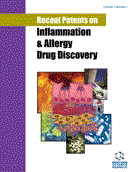Abstract
Inflammatory bowel disease (IBD) consists of Crohn's disease (CD) and ulcerative colitis (UC). It is thought to be caused by genetic, abnormal immune response of the intestinal immune system and dysfunction of intestinal mucosal barrier against enteric bacteria. Mutational genes can affect the development of IBDs via certain signaling pathways. The abnormal signaling pathways play an important role in the inflammatory process and can lead to dysregulation of the inflammatory response and are crucial in the pathogenesis of IBDs. The signaling pathways mainly include P38 MAPK, JNK MAPK, PI3K/Akt, NF-κB signaling pathways. Intestinal microorganisms play a key role in the initiation and maintenance of disease. Disorders of signaling pathways including TLR, NF-κB can act on the intestinal barrier, and cause uninhibitedly release of effector T cells which are the central cells mediating inflammation in CD. This review highlights relevant patents and a new insight of signaling pathways associated with IBDs will help to develop better therapeutic approaches.
Keywords: Signaling pathway, IBD, Crohn's disease, ulcerative colitis, TLR, NOD, P38 MAPK, PI3K/Akt, NF-κB
 66
66


















